What exactly am I expecting Ukraine to be like? Well, nothing too crazy – I’m here to work on a documentary film not to get myself shot at. But it’s easy to get into the spirit of the thing – the discount from the copy shop that makes up my press badge for the Armed Forces of Ukraine (“it’s a good thing you’re doing”), my first visit to an army surplus store where I am outfitted for a gas mask (apparently, you’re supposed to be clean-shaven so the mask adheres perfectly to your skin), and then the sour DHS officer meeting my group right at the entrance to the jetway to inform us, per the body armor that’s spotted in our bags, that if anything happens while we’re there the U.S. government won’t come to get us.
Since I’m a war rookie, all this is – if we’re being honest – fun for me, drafting my will on a layover in the Amsterdam airport, downloading the app for air raid alerts. But everybody I’m encountering along the way, the military veterans and veteran war correspondents in my group, the guys in digital camouflage we pass at the baggage claim in Krakow, have a look like they’ll be taking incoming the moment they cross the border. And the surprise – what seems to have occurred to none of us in our pre-trip preparations, our visits to REI for satellite phones and dehydrated food – is that Lviv is actually a very pleasant, perfectly functional city. Ride apps work, coffeeshops are open – Lviv is famous in Ukraine, we’re told many times, for its coffee culture – the streets are full of musicians, a mix of classical music and war songs. The air raid sirens do go off pretty often – and our air raid app is in constant panic – but, by this stage of the war, it doesn’t seem to affect anybody’s daily life, and, eventually, everybody I’m around deletes the app. We visit a bomb shelter once – the basement of the hotel next to ours – and read for about half-an-hour until we get bored and go back to our rooms to sleep. Once, when we’re in Lviv, a missile hits a fuel depot on the outskirts of town – by common consent, it’s agreed to really be aimed at Biden, who’s giving his speech in Poland – and Don Lemon delivers his breathless report from the site of the strike, wearing a perfectly unnecessary flak jacket and helmet.
What’s unexpected as well is that the Ukrainians have decided, apparently, to fight the war dry, the thought process being that alcohol would take away the fighting edge, but it’s hard to keep journalists from drinking and ways around this are discovered. The best place to drink in Lviv is called Kryivka – an underground bar cellar, which makes incidentally for an ideal bomb shelter and seems to have arrangements to circumvent the dry régime. Lviv is a touristic city and the Krivkya management have an astute sense of their clientele. When you enter you’re greeted with the ‘password’ ‘Slava Ukraini.’ You have to answer with the countersign ‘Geroem Slava’ and then you’re seated – and the only beer on tap is ‘Putin Huilo’ (Putin Asshole) beer.
But the existence of this sort of war kitsch is not to say that there isn’t a war on. The missile strikes are real, the funeral procession we come across is real, the streets are full of Territorials and block posts with their painted ‘Putin Huilo’ and ‘Russian Warship Go Fuck Yourself’ signs. The smart discussion at the time I’m in Lviv is about whether Belarus will enter the war – which actually seems very likely at the moment, a stab in the back, and what would be logical enough, a quick strike to take Lviv. And the conversation in lower tones is about the possibility of a nuclear attack (and who can rule it out the way Putin’s behaving) for which Lviv would be a prime candidate with all the foreign volunteers and the city’s history of anti-Russian resistance. It’s only quiet right now because the Russian war effort has been both asymmetric, focusing on specific pockets of the country, and weirdly, inexplicably inept – no concerted attacks against perfectly obvious, viable military targets and then, for no reason at all, brutal atrocities against civilians.
The Ukrainians are, by contrast – what else is there to say? – terrific. “It’s hard not to fall in love with that country,” says a risk assessment analyst just before I arrive, which turns out to be true and is a surprisingly moving thing to hear from a guy in combat insurance. The humanitarian aid centers are buzzing with supplies and volunteers to distribute them. The refugee crisis is very different in real life from how it’s depicted on the news – it’s just a quieter phenomenon than how I’d imagined it, people being taken in by friends and relatives, these relationship networks stretching deep into Europe, especially into Poland (and, to everybody’s amazement, the Poles have been, by all accounts, great). There’s a certain amount of patriotic fervor – ‘there are no good Russians’ is a meme, the word ‘zombies’ comes up fairly often – but the impromptu history lessons that weave their way into just about every conversation I have are reasonable and nuanced. The underlying point is that Ukraine deserves its nationhood just as much as anybody else does – the Ukrainians were horribly oppressed historically (a colony for various empires is probably the best way to think about it) and were, as somebody expresses it to me, ‘lazier’ in their independence movement than, for instance, Poland – and, with 1991 and with Maidan and with the heroic resistance to the invasion, which has been a pleasant surprise to everybody, Ukraine is finding itself as a nation-state, and all the Putinist talk about ‘Brother Slavs’ and so forth would just be uncool and old-fashioned if it weren’t such a slender pretext for brutality.
The foreign volunteers, on the other hand, are restless and struggling with a very unexpected set of circumstances – having traveled all the way to Ukraine only to discover that they’re not particularly needed. This is fundamentally a good problem – Ukraine’s infrastructure is functioning well, the military has plenty of troops at its disposal – but it is frustrating for the volunteer soldiers, medics, aid workers whom I come across. The International Legion simply hasn’t worked out – too many of the volunteers were unskilled; there was too much of a culture clash between the volunteers and Ukrainians. “It was run by these alcoholic ex-Soviet generals, just a numbers game, like ‘that way is Russia,’” said an American volunteer who had come to join the Legion. “I didn’t really want to do a human wave attack against Russian armor. That’s a good way to get yourself killed.” An alternative is to join the Georgian National Legion, but that’s a real left-turn for a lot of people. Another alternative is to try to integrate somehow with regular Ukrainian units. A lot of the stories I hear are about trial periods, people being with, say, the Georgians for a couple of weeks and then getting dropped off at a train station with a handshake.
The volunteers I’m encountering split into two types. There are the younger guys who are recently out of the regular military and are basically chasing a high – action, camaraderie – and are contending with the possibility that they may never get back the ‘lightning’ that they had from their time in the service. They tend to be fairly idealistic, much of their conversation is about whether serving in the Ukrainian Armed Forces would give them the opportunity to become a Ukrainian citizen. Why any of them would be so intent on becoming a citizen of Ukraine, I don’t know – I don’t hear a word of Ukrainian or Russian spoken by any one of them – but the beauty of Ukrainian women seems to factor heavily into these calculations. And then there are the older ones, for whom it’s a profession. “I dabble in conflict,” says one veteran special forces guy whom we meet in, of course, the Grand Hotel in Lviv and who proves to be an invaluable connector.
What both camps have in common is difficulty figuring out exactly what to do with themselves. “Everybody’s trying to figure out if they can push on to Kyiv,” says the risk assessment guy a little sardonically – since he’s been making regular supply runs for weeks between the two cities. The Russians – unbelievably – have just pulled back and that opens the way for whole convoys of lost boys and war correspondents to make the long drive, the same faces I’ve started to get used to in Lviv rematerializing in Kyiv. And, once again, it’s hard not to get into the spirit of things. An ex-Navy SEAL I meet on arrival in Kyiv says, “Lviv is a cool city but it’s like Disneyland there” – as if we’ll be in the shit here.
***
But it turns out that Kyiv is also a very pleasant, smoothly-functioning city, maybe not as postcard-pretty as Lviv but not as touristic either. The place to drink there is called Buena Vista – again, the management has some special dispensation from the city and some of the clients seal the deal with little gifts to the block post outside – and I find it much more congenial than Kryivka. It attracts a motley crew – some of the regulars leave room for their weapons on the seat next to them – and it becomes base camp for me for over a week, a confusing period in which I’m waiting for access to film with a unit and in which I meet many people and have basically no idea who any of them are. The working assumption – freely indulged in by my cameraman, a veteran war correspondent – is that everybody’s in intelligence, although maybe nobody is.
What is really happening for me, in my début in war, is that I’m discovering the existence of a robust war economy, which dutifully follows conflicts wherever they break out around the world. And Buena Vista is an ideal site for reunions for this crowd. A frequent route is Ukraine (Donbas), Burma, Syria (with the YPG), Mali, Chad, and Niger for the real hardcore, and then Ukraine again. One of the volunteers actually screams with excitement when he sees my cameraman – he last saw him in Syria with the YPG (the volunteer had a different name then), and they were together in a house that came under fire from the Turks. The idea for the soldier-types here is to form groups, to get themselves in with people they feel they can trust and then get to the action. The idea for the journalist-types is to show that they can hang. The underlying question for everybody is – how far in do you want to go? what is your appetite for risk? And, very clearly, for most people in this world – ex-soldiers and war correspondents alike – that’s the only question that has any value. The game is to engineer the right amount of risk and then to test yourself in it. The issue, of course, is that there’s no inherent limit to the risk – and no way back, as is clearly the case for, for instance, the special forces guys who never really put the military behind them, the journalists who are bitterly complaining that they might have missed their war.
Cynicism is the default mode here, but there’s a funny kind of idealism underneath all of it – for the journalists who dream of summoning international outrage, for the volunteers who clearly are hoping to find their way to the Lincoln Brigade. The cameraman’s theory is that they’re all spiritual descendants of Byron in Greece – and they all have a bit of a chip on their shoulder about the media’s hierarchy of suffering, how nobody pays attention to Mali or Burma; and about the fickle nature of the international community, how everybody will move on from Ukraine in about two minutes.
For us, it’s simpler – just to make our presence known, gently secure our access. “You’re like flies on shit,” one of the soldier-types says to the cameraman and myself, which we take to be a compliment, it means we’re at least being noticed. “This is the hard part,” the cameraman says to me motivationally. “Anybody can make a call sheet or hold a camera, the hard part is this – how you move, how you act, how you show that you can be trusted.” Which at least is something to cheers to.
And it actually does seem to work. One of the guys who’s maybe a volunteer and maybe a mercenary and maybe connected to intelligence comes by to the ‘kids’ table’ where the two of us are drinking and asks about the film. I’m giving my spiel and he gets a misty look and says, “I need specifics,” which means that somebody’s sent him to figure out how to satisfy us so we go away. And then within a day or two of that we’re invited to film with a Ukrainian battalion. “We have decided to trust you,” says the colonel when we arrive, which are rare and wonderful words to hear when you’re a producer.
***
For me, this begins an enjoyable few days connected to the battalion, which mostly means being a house guest of the colonel (he lives within walking distance of the hotel where the battalion’s being put up). He turns out to be a real renaissance man. He’s handsome, charming, quotes the Bible for its ‘management tips,’ builds motorcycles from scratch, plays the piano for us, plays us in ping-pong – he, of course, plays competitively in tournaments.
The battalion is obviously very high-class, well-turned-out, everybody’s very friendly – everybody has nicknames that suit them perfectly, there’s a Falcon, a Hawk, a Hammer, a Flower (the press attaché), a Sprout, and the immediate preoccupation on our arrival is to ensure we have nicknames too, and I become Prince and the cameraman becomes Chinghiz Khan. The question is what’s really going on, what are they doing, why has the colonel decided to take us in. And maybe it’s straightforward enough – they’ve been at the front line, now they’re back for training before the next round of fighting, we’re maybe useful for propaganda purposes, but then it’s odd that the colonel looks almost offended when I offer diplomatically to do an interview with him, ask if he has some ‘message’ he wants to share. There are evidently all kinds of politics going on. It seems that every few days a general visits and, the way I picture it, they have blinis at the colonel’s house and the colonel plays piano for him, and the general says that it might be a good time for the battalion to head to the front and the colonel, as charming as could be, says that, actually, it’s not a good time. It’s all tank battles in the east and the battalion, as the colonel very reasonably points out to us, doesn’t have any anti-tank equipment. For heavy weaponry, all they have is Dasha, a mounted machine gun, and as the colonel tells me sadly, “Everybody keeps trying to take our Dasha.”
The cameraman is convinced that the colonel is secret services and that they’re training for some kind of sensitive spy-clearing mission – but if that’s the case why invite us to film so much of what they’re doing? And, meanwhile, the colonel is convinced that the cameraman must be secret services of some kind and gives him a new name of Mechanic. “A guy like this has many names,” he explains. I’m back to a phase of not knowing who anybody is or what’s really going on. It seems very hard to believe that this is what the war is like – in Lviv, for instance, I’d gotten used to practicing a kind of op sec, turning off geolocation on my phone when I’d visit one of the hideaways for volunteers, but that seems not to be necessary here, everybody is on their phones all the time.
Actually, the Falcon explains when I get him alone, it’s the phones that are making all the difference in the war. The Russians have confiscated their soldiers’ phones – presumably so they can’t call home and tell people what the war is actually like – and that means that they can’t communicate with each other and can’t locate themselves. They’re relying on paper maps and street signs, but the maps are outdated and the locals change the street signs around, so it’s a complete failure. “They just run away every time we fight them,” Falcon says. “And then they attack civilians.” He’s my favorite in the battalion and clearly the colonel’s favorite – he’s a scrawny guy, which I appreciate, with a very angular face, and the colonel says that he’s absolutely terrifying as a fighter. “He’s maybe too good,” the colonel says and sounds genuinely worried for him. “He has no fear.” Everybody is very anxious that I see a video of him visiting his mother for the first time since he’s been at the front, and I don’t really know how to make use of it but it is a beautiful thing to see – how proud he looks opening up the gate to his childhood home, the way his mother doesn’t say anything, just folds him into her, clutches at him.
***
There is another side to the war besides the colonel’s charm, the battalion’s easy living. I spend some time looking to document damage within Kyiv, and the city itself hasn’t been hit very hard, but there are these baffling anomalies: a section of a shopping mall flattened, the word ‘Sport’ visible from the awning of one of the collapsed storefronts; a pair of apartment buildings hit by bombs – the buildings charred, cars incinerated where they had been parked, windows blown out and belongings (sewing machine, refrigerator, kitchen counter) strewn across the floor of the apartments. “Why these buildings?” says my companion Anton, an IT analyst moonlighting as a driver, at the apartment complex. “There are no military targets anywhere near here. There isn’t even a shopping mall where soldiers could gather.”
At the time I’m in Kyiv, Bucha seems to be the center of the world – and everybody in the journalists’ hotel is figuring out how to go, whether to latch on with a press pool or with military escort. The day we travel, with some of the battalion, there’s a massive traffic jam – the word ‘PRESS’ taped on the sides of many of the vehicles – but we’re with the right people, and the Hawk and surprisingly often the colonel himself keep leaping out to clear traffic.
In Bucha there’s destruction everywhere. Some time is spent standing around various collapsed structures trying to work out what they might have been – a gas station? a shopping mall? Most of the bodies have been buried but there are still a few on the street. There’s a soldier – I’m told a Russian tanker – lying face-down between the sidewalk and street, his feet blown off. There are other signs of people – pants, a soldier’s headgear. I take a photo of a boot, thinking that that’s poignant, and then in my frame notice a severed foot next to it.
Attention is given to the rows of destroyed tanks and armored vehicles that line the streets, but what gets me most are stray details – a billboard from before the war advertising ‘the new center of Bucha,’ a sign outside a house saying ‘beware of dog,’ a van burned out in its spot in the garage – these details for some reason more affecting than the bullet holes in windowpanes, the desperate white paint on fences saying ‘Lyudi’ (‘People’).
It's difficult too to figure out the right attitude. Somebody says, “What has humanity come to?” which is inane. Most people – soldiers, journalists – are taking selfies; the whole area is being sprayed with photographs. Everybody’s shtick is to appear unflappable – the soldiers are discussing the make of destroyed vehicles, the likelihood of mines. There are very few inhabitants around – a handful of beleaguered-looking older people surrounded by journalists. The smart question at the moment is whether the atrocities have been carried out by trigger-happy soldiers or by einsatzgruppen-type forces with orders from above, and I feel like a jerk for even thinking in those terms – from the perspective of Bucha it couldn’t possibly matter less.
The mass grave has been dug as kind of an adjunct to the cemetery next to the church. “We took corpses from the street and if nobody recognized them put them there,” one of the soldiers explains to me. Most of the bodies in the grave are in black plastic bags and some are lightly covered in dirt, a few limbs still visible. There’s nothing really to say as we all stand around it. When I smoke a cigarette, it hits me differently than other cigarettes – right to the base of my spine. The group I’m with drifts over to some freshly-made graves, with crosses on them, and it’s something of a relief to be around names and dates, some sense of narrative. Everybody’s very taken with the lifespan on one of the graves – born just before Hitler’s invasion and then died in Bucha in March. As we’re leaving the site, the colonel turns, and his tone is very different from anything I’ve heard from him before, no charm, points to the mass grave, says, “There’s your message.”
***
By this point the cameraman and I have spent a lot of time together. For the most part, we don’t even talk about anything in Ukraine anymore – we’ve moved on to relationships and philosophy, other wars he’s been to – but he can tell that I was affected by Bucha, the way I’d smoke cigarettes there, the way I’d sometimes puff out my cheeks when I breathed, that I wasn’t as unflappable as the others. He’d asked me if I had a photo of the severed foot on the street – a journalist friend had asked him for it – and is a bit disappointed but not surprised that I’ve deleted it from my phone. “I think this is your first mass grave, yes?” he says.
We’re at the Buena Vista – live musicians are back, a Ukrainian salsa band; a new wave of volunteers looking to make their contacts, find their way to action – and he’s in the mood to dispense advice. “War is not the frontlines,” he says. “People on the frontlines have a death wish. War is for civilians. War is for the whole country. There are lines you cross – the first time you get shot at is a big deal, there’s just something you switch into. Me, I’ve been doing this twenty years, and what I do, it’s a bit fucked up. Like my friend, he heard about that severed foot and he was immediately like – send me a photo.”
We’re both very drunk and he’s really getting into a stride. “You have a decision to make,” he says. “To be a producer, there is money, a good living. But if you want to be a writer, here’s what you do – describe your emotions on the way to Bucha, what were you expecting of your first mass grave, what was your first mass grave, what was it really, everybody taking selfies, my friend asking me for the photo of the foot, it’s all part of it.”
We’ve been inseparable for a long time – a united front for the colonel, for the maybe-mercenaries, but it’s obvious enough that our paths are diverging. I’ll leave pretty soon, he’s going to meet up with another ex-soldier arriving in Lviv, somebody he knows from the YPG, and he’ll go through the same thing all over again, try to follow him to the front line. He had been in the navy and then become a war correspondent. He’s a Taurus with Taurus rising, he’s told me, and was born in the Year of the Tiger. His passion is for bullfighting, and war, he says, is his ‘destiny.’
And, as for me, I’m not sure when I’ll be back in a place like the Buena Vista or Bucha. There is a taste for it that I’m picking up – no question about that – am having fantasies about maybe hiring Anton separately from the film, pushing on to Kharkiv or Chernihiv or the Kramatorsk train station, wherever the fresh batch of headlines are coming from. The way the cameraman is talking, everything is like an invitation, a door opening. “I saw you were a writer from the first moment I met you,” he says. The Buena Vista is a surprisingly literary bar – and the cameraman is literary, Orwell, Conrad, Jack London are all referenced at one point or another – but, really, for him and for all of the conversations I overhear, there’s only one writer. “But you also have to be a good writer,” he says. “If you want to be a writer you have to be like Hemingway, short and sharp. You can’t add, you can’t preconceive. You have to describe everything exactly as it is. As embarrassing and as raw and as terrible as it is.”
We’re really in the best phase of drinking now – the whole point of it – where you’re really lucid and want only what’s best for the people you’re with, where there’s no responsibility for anything anybody says. But there’s curfew – we’re getting kicked out, we’ll have to beg forgiveness from any block post guards we meet on the way. Everything is a wash for me at the moment, ping-pong with the colonel, the mass grave in Bucha, lots of time being bored, lots of time drinking – it’s my first experience of war and, if I’m being honest at all, it’s completely shapeless, I’m not even trying to figure anything out. I just go to the men’s room and, before I forget it, write down everything the cameraman said.




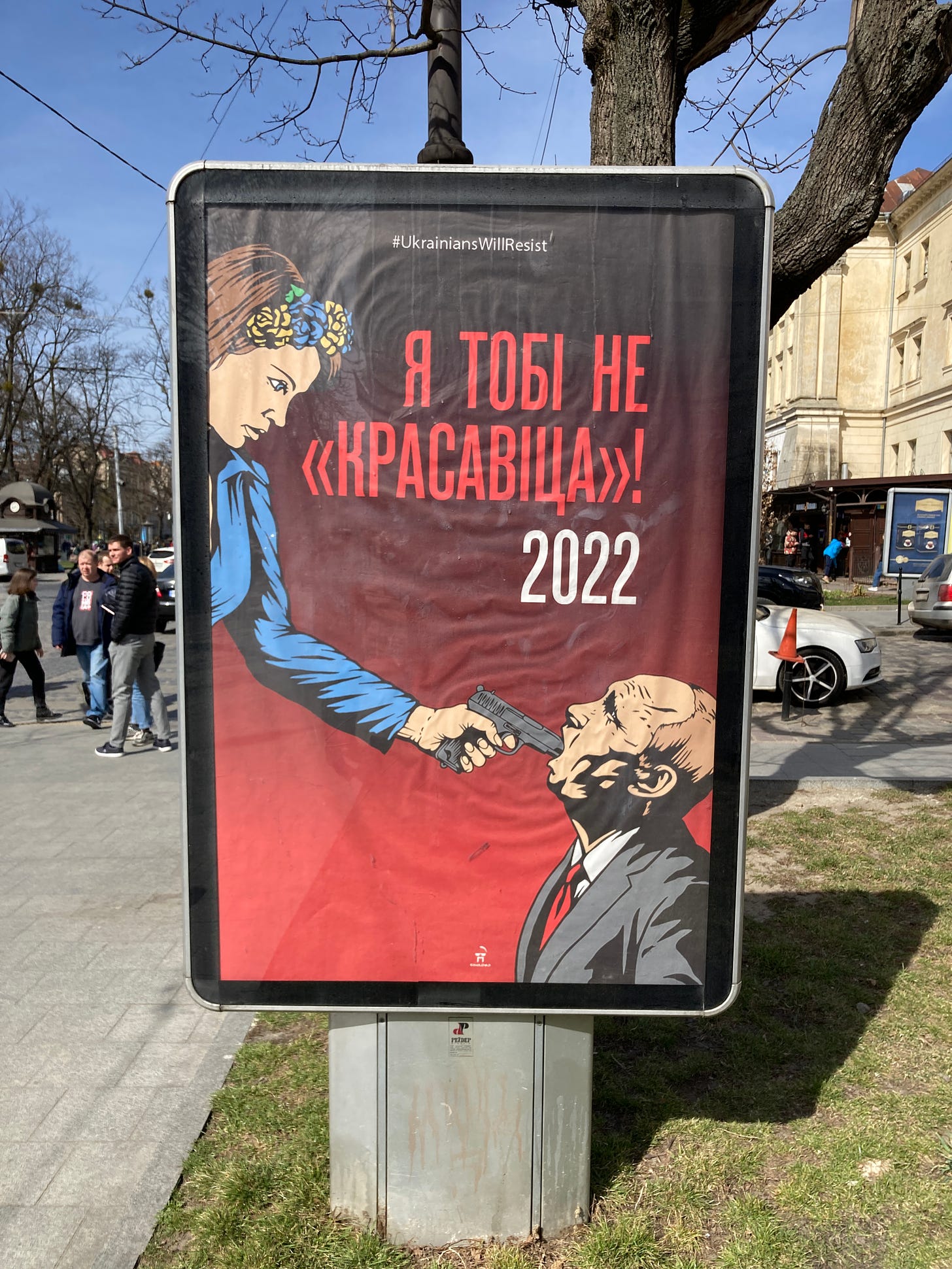
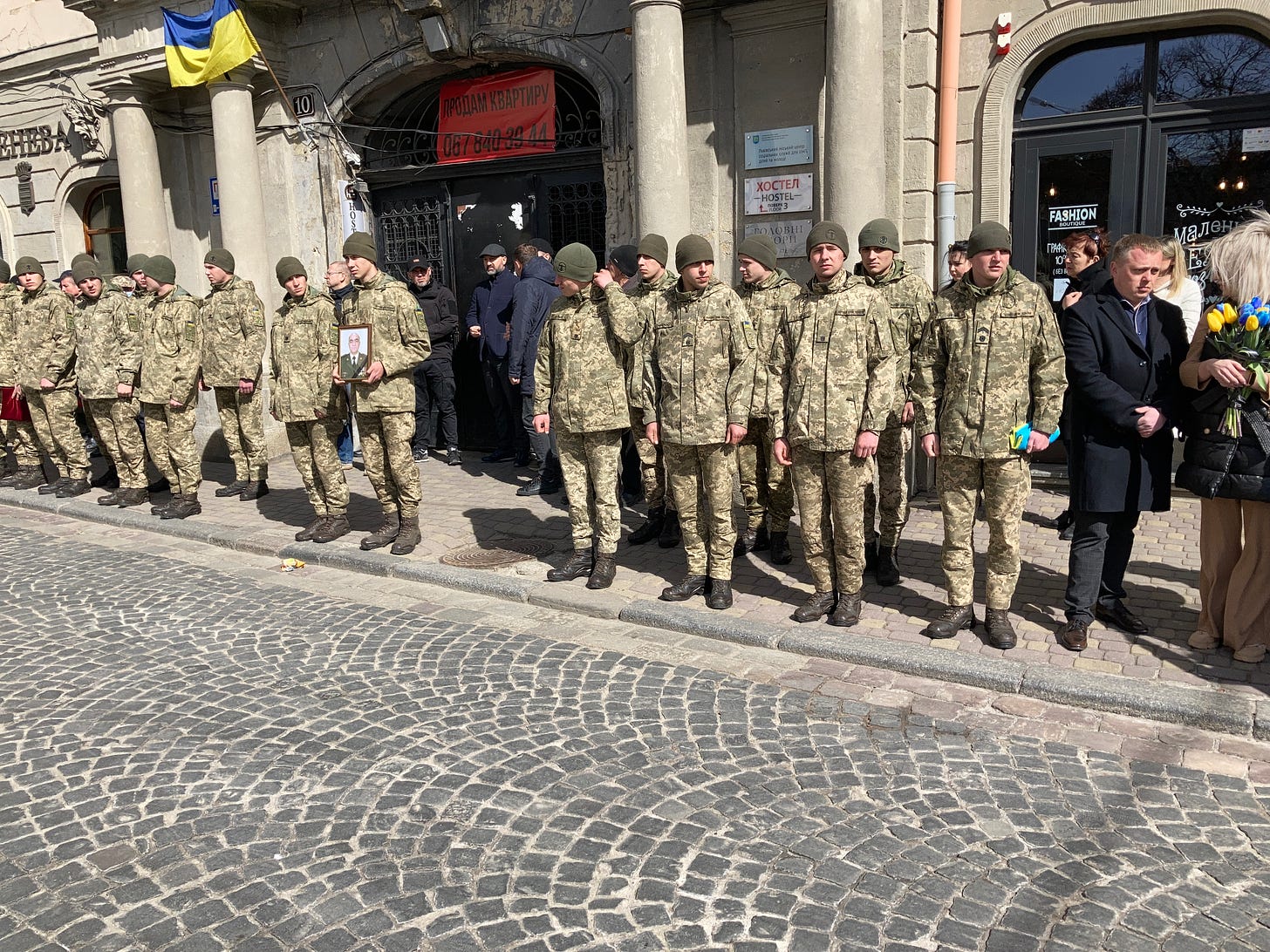
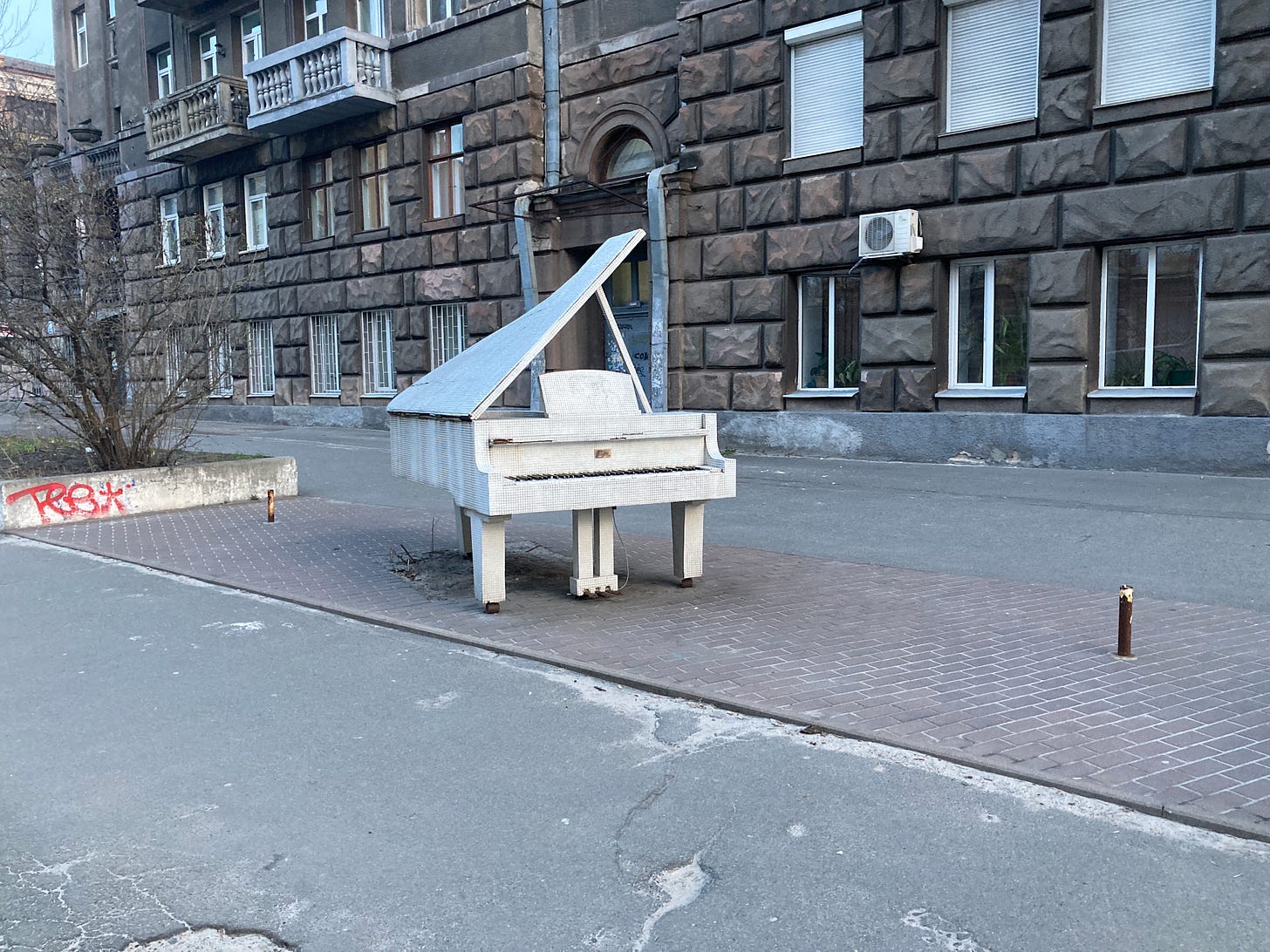
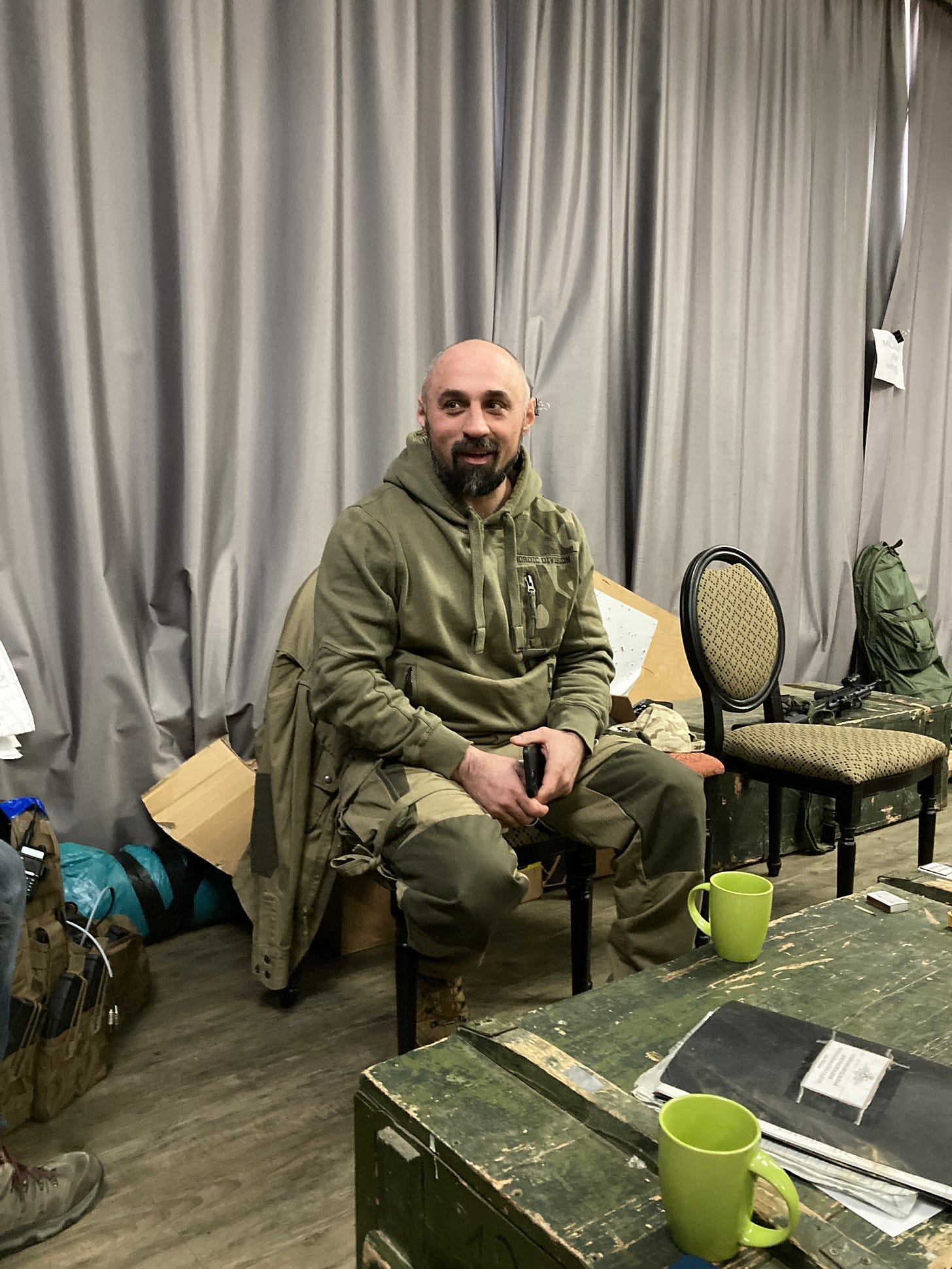
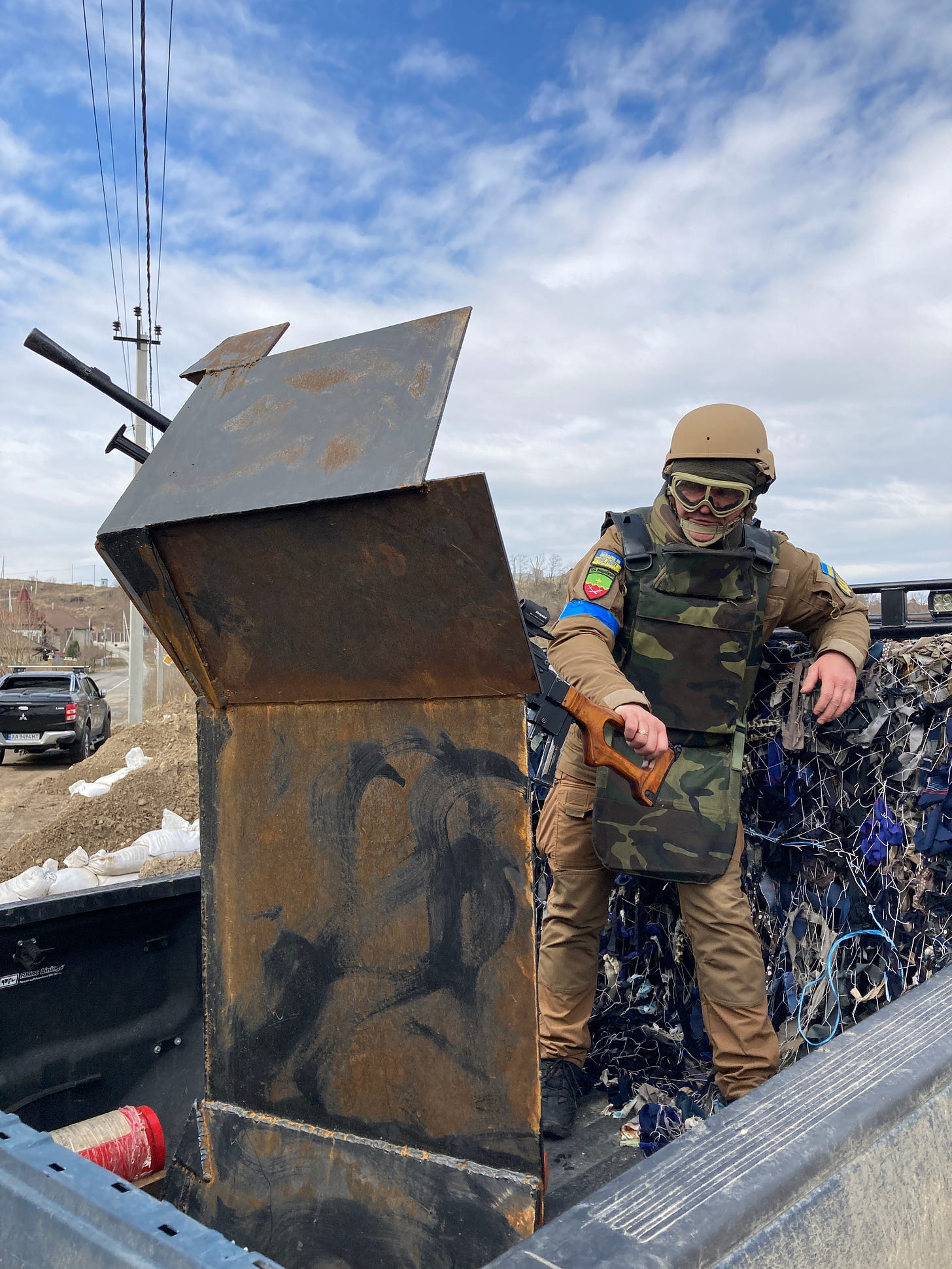
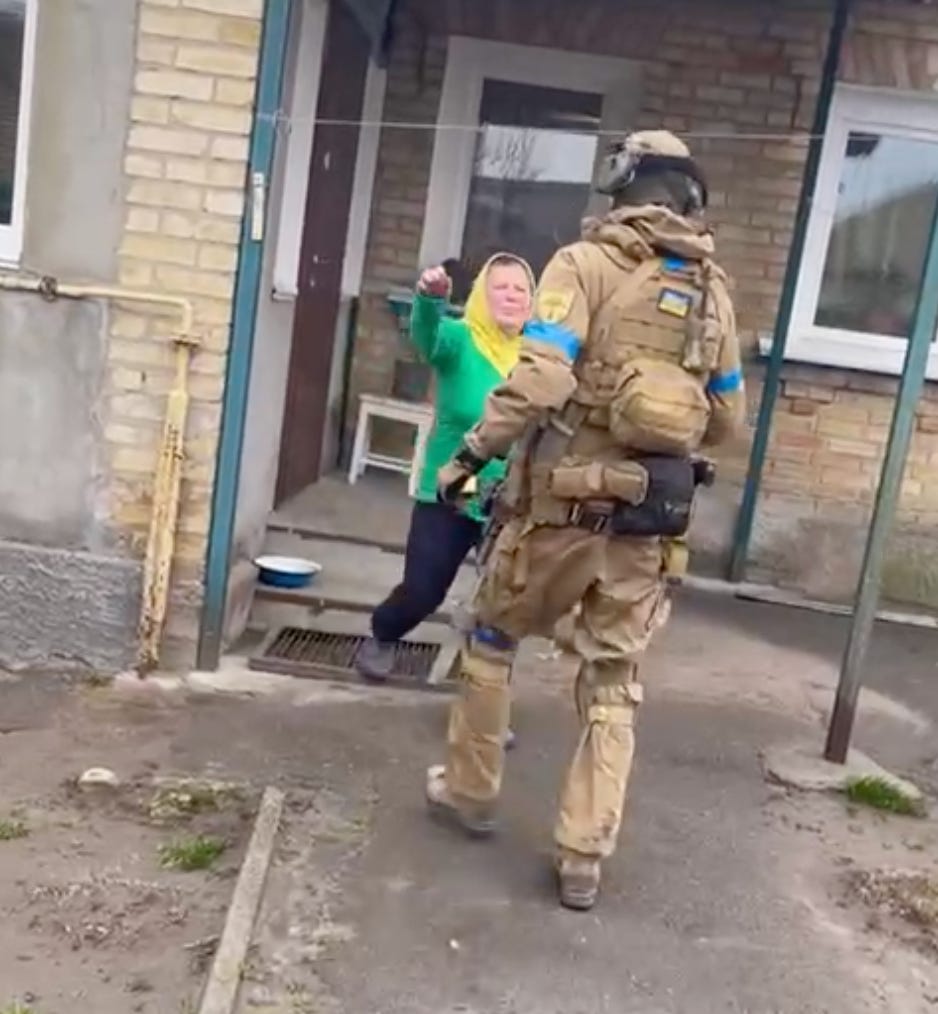
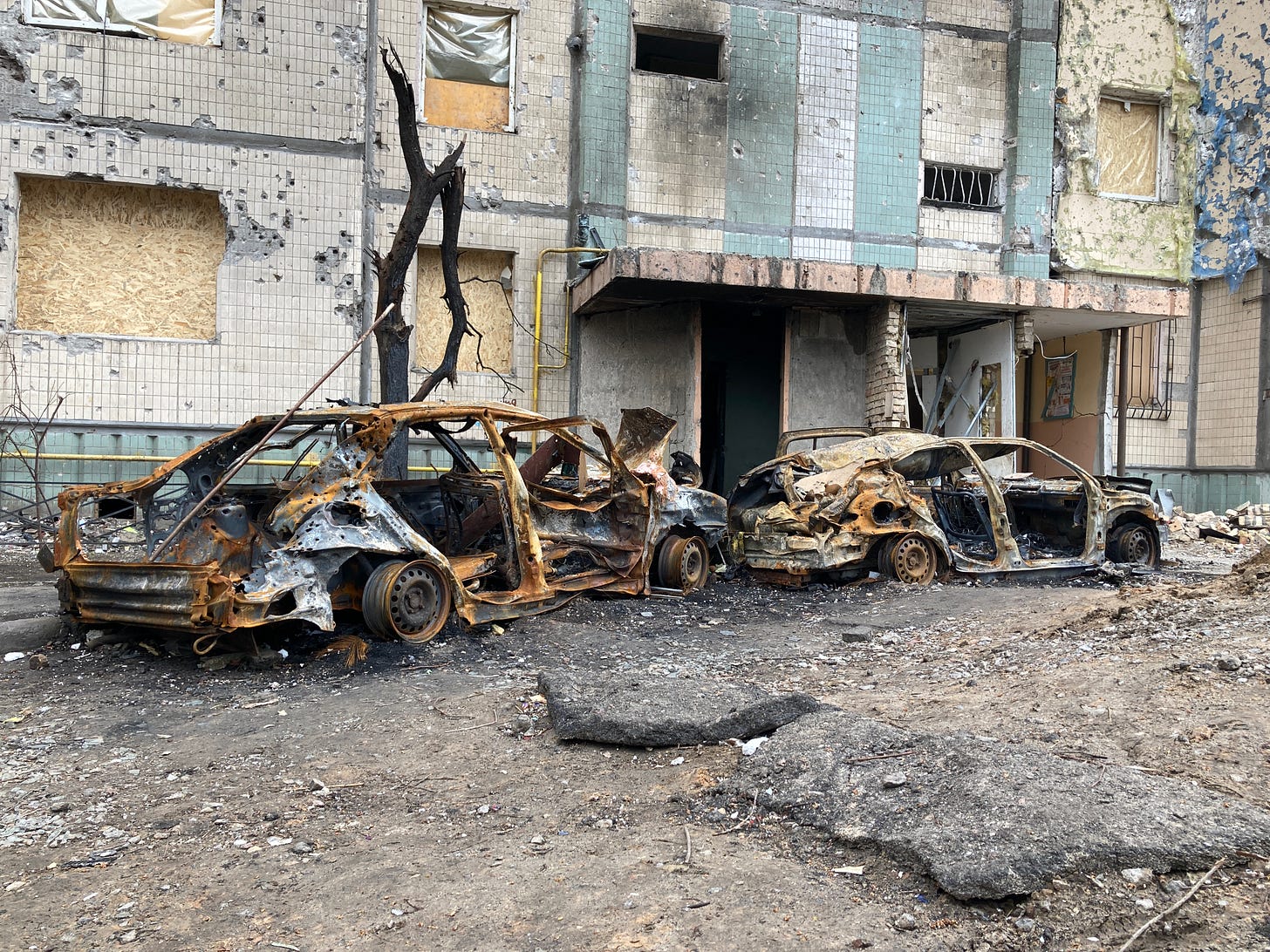
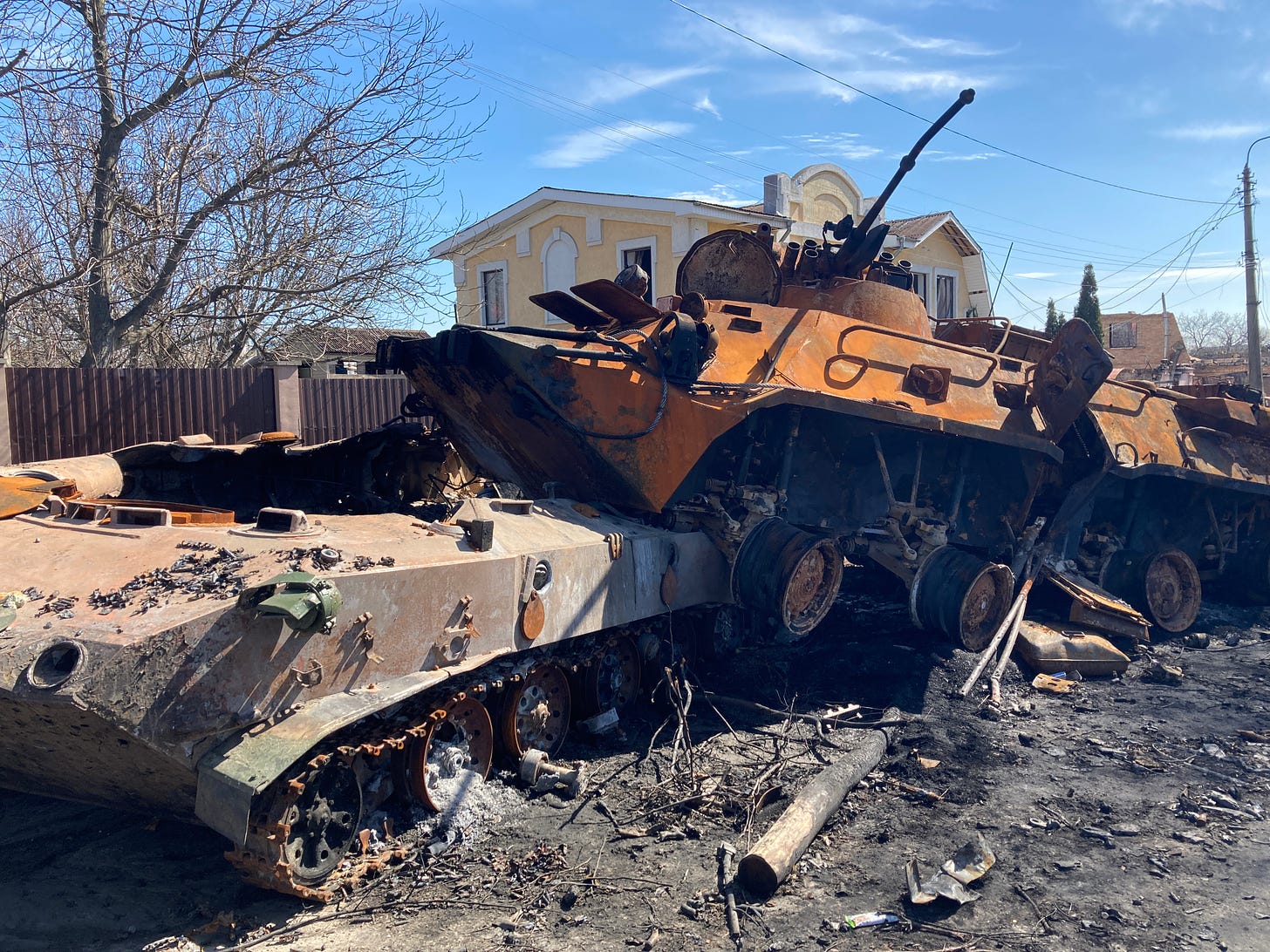
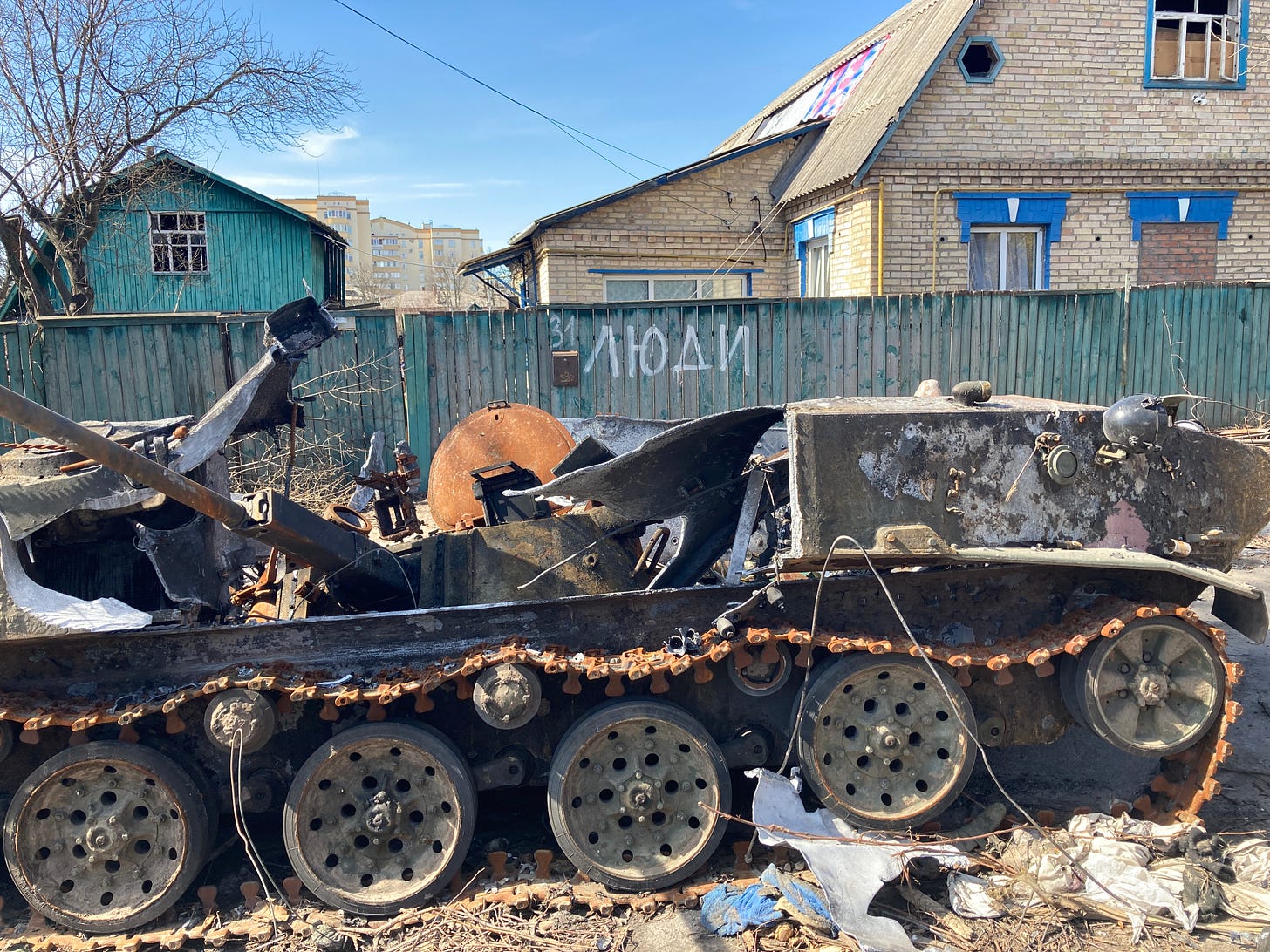
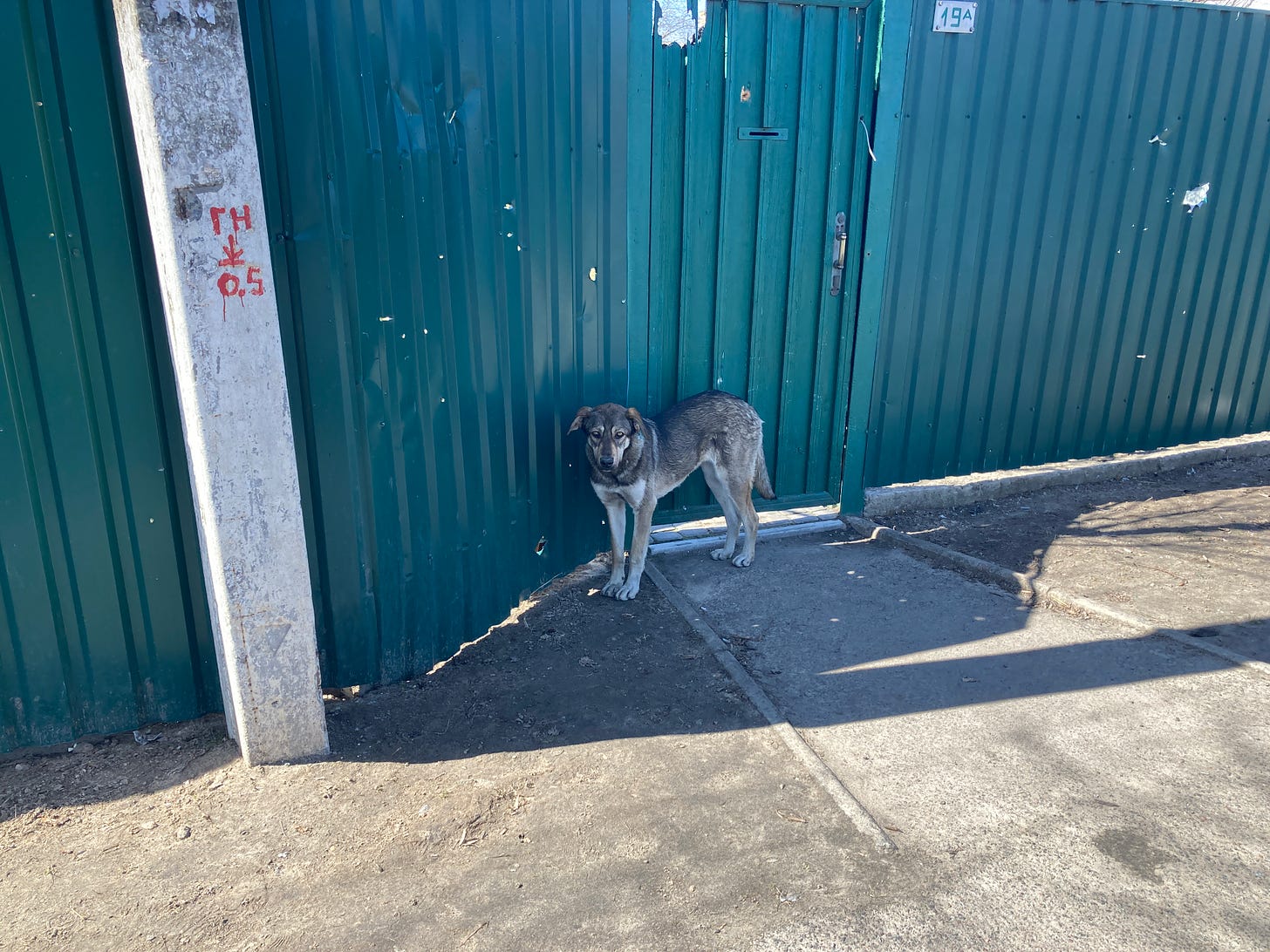
Agreed! This is a really nice find!
So cool! Thx for sharing